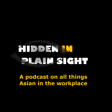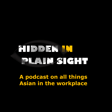Become a Creator today!Start creating today - Share your story with the world!
Start for free
00:00:00
00:00:01

What to do about stereotypes in the workplace?
In this episode, we continue the conversation about stereotypes and their effects, but provide a positive spin! Specifically, we focus on coping strategies and how we’ve managed to deal with common workplace stereotypes. Tune in to find out more about how we coped with these experiences and whether any of our examples resonate with you!
Haiku
Stereotypes bind
Empathy breaks the stronghold
Hearts embrace what’s real
Articles for Nerds
Inside the prism of an invisible threat: Shining a light on the hidden work of contending with systemic stereotype threat in STEM fields.
How to Overcome Stereotypes in Your Organization
https://online.hbs.edu/blog/post/how-stereotypes-affect-an-organization
Transcript
Introduction to Asian Stereotypes
00:00:08
Speaker
Welcome back to another episode of Hidden in the Plain Sight. I'm one of your hosts, Jenny. I'm Echo. And I'm Joe. So our last episode, we have talked about what are the stereotypes for Asians. And in this episode, we definitely wanted to dig how we actually deal with them. What are the coping strategies that will be my
00:00:32
Speaker
have to deal with those stereotypes.
Stereotype Threat in Workplaces
00:00:35
Speaker
And I think for this, we're going to have to lean in more on our experience. And we'll reference some of the research, but there hasn't been any type of study looking at stereotype threat and how Asians navigate it in the workplace out there.
00:00:48
Speaker
Not that I've seen. So I think this is us by having we have to kind of, you know, be on the cutting edge with this and like in a way convey to really our audience like what we've done in the past and maybe that's what they can potentially do or improve upon that to navigate around these stereotypes. Right. Though we haven't found that much of a rich study just on like navigating this for Asians. But we also know there are tons of studies out there just trying to see
00:01:16
Speaker
how we can leverage the general study on like people deal with stereotypes and stereotype threats, right? Just off the top of my head, there was an article that or research study that our advisor did several years back looking at how female scientists navigate stereotype threats in STEM. And let me look it up. They found three types of behaviors and I'll briefly summarize what those are. So they found that women would either fend off the threats
00:01:44
Speaker
confront the threat or sustain the self in the presence of the threat. Offending off the threat was basically keeping gender invisible to others or downplaying one's gender and kind of internalizing blaming the self.
00:01:59
Speaker
Confronting the threat was taking on more of an active role, so that it involved advocacy, revenge, productivity, so that's overcompensation. And then the third one, sustaining the self in the presence of the threat, that involved redefining criteria for success and choosing when to fight your battles, so when to stand up and when to stand out. That sounds exhausting.
00:02:26
Speaker
Yeah, that sounds exhausting. I think that's why a lot of people leave and I'm wondering if similar patterns would play out for Asians who are tired of dealing with stereotype threat.
Perceptions of Experience and Professionalism
00:02:37
Speaker
Could we break down like a superficial one? Like, could we talk about like what for some are Asian folks, like maybe what looking young in the professional workplace, what that means and
00:02:52
Speaker
how we can even fend some of that off. Yeah, so what does that mean? Looking young means inexperienced. Yeah, it could mean that. Gosh, I just remember I was an adjunct in my mid-20s and I think I just looked like all the other undergrad. I was teaching freshman and sophomore. There's just an undergrad class.
00:03:18
Speaker
And I think I was quite aware of it. And I just dressed up in a slacks dress shirt and tie all the time just to get away from that. But I'm not sure if there's anything else I could have done at that time to kind of fend that off other than my talk about my experiences and try to look the part. So you showed up to work. Is that why you're always dressed to the nines?
00:03:46
Speaker
At conferences, yeah. But listeners who don't know, or it's quite often that I would run into Doug on campus and he would be dressed in a dress shirt and dress pants carrying his beefcase. I mean, there are times where he was in his t-shirt, but
00:04:03
Speaker
I think a lot of times you were dressed up when you were teaching class. Yes. I figure that was one of the ways to kind of navigate it. And I feel like at a certain point we have credentials as we progress on. I think even the fact that you mentioned briefcase versus backpack, these are the little things I picked up on the way. And I'm not carrying a backpack. I'm bringing a briefcase. Or if I do bring a backpack, it's going to be something that's not
00:04:32
Speaker
you know, student-like. And I guess the way I carry myself in my tone and my voice too, just to make sure that I'm coming off as an authority figure to the students was something that I kind of learned to navigate as well too, to make sure that they take me seriously, you know, even though I know I had the credentials, I had the experience and I felt like I could have taught and, you know, these classes, I think they're,
00:05:02
Speaker
are times where I'm like, I felt too that, you know, they may be thinking that I don't have the experience or that's been said in a very subtle way to me. You look so young, like, how old are you anyways? You know, you look like one of us.
00:05:23
Speaker
Those are like, I feel like the little things that make it so that, what are you saying? What's going on? What's operating here? I'm trying to teach a class and you're telling me I look the same age as you. Not really. I mean, I can see how that can, Asian men can respond to that more naturally versus like Asian women. I think there's actual social norms on how the age can be shared or not.
00:05:49
Speaker
expectation I think like in this case you wanted to be able to look young but at the same time you wanted to be seen as like experience it's almost like you wanted to de-link
00:06:00
Speaker
age doesn't equal to experience or you want it to dening on like age doesn't necessarily mean that you don't have the competence to do this work. So it's a lot of self monitoring. It's a lot of I call it mental gymnastics. Thinking about like positive ways like things that we can do to navigate this and you know
Challenging Workplace Norms
00:06:20
Speaker
fend it off. Like what are some things that you've done? So Doug you've
00:06:24
Speaker
dress the part, so you wanted to gain their respect, be seen as the authority figure. And the way you did that was carry your briefcase, dress very well. Echo, what about you? I mean, have there been situations where, you know, you felt like you had to act a certain way and it paid off? This is like, goes back to, like, my last stop. I often get tasked to do a lot of, like, research design and running the models and write the final report.
00:06:53
Speaker
But at the time, I think part of it is due to my career stage, but also due to the seniority within the team. Even though I'm the one that is usually doing the work itself, but it's always other people who get the report in front of the senior executives or the folks outside of our team.
00:07:19
Speaker
So there was like one time I just said to my boss, he was like, hey, I realized I have been running this project from end to end, like from day one. So it's almost like ask for her permission. I'm like, hey, can I actually also doing the final presentation all by myself? And I feel confident because I have been doing this for two years now and I've seen other peoples how they were
00:07:47
Speaker
getting this in front of people. And so can you help me to see if we can make this happen? So in this case, I'm almost like inviting my boss to become my sponsor or advocate for me to do this because I wanted to break that pigeonhole on like I'm just the one that behind the scenes and not to put myself out there.
00:08:11
Speaker
And my boss actually helped me on that. It was quite a bit of like a successful experience for myself and also for the team. Ever since then, I think the team started to pick up on, oh, because someone actually did this work, they should be the one actually also prevent the work. So I think that started having this kind of like a nice cycle.
00:08:33
Speaker
Transciter Echo, you're a translator. That was the one moment I also realized, well, sometimes you just got to try. Like sometimes you just got to, of course, in this case, I know this because I have confidence in my own work and I have confidence that I can prepare enough for me to be there in front of like the exact audience. But
00:08:58
Speaker
Again, I can see that also taking some work to get there, and even that one step further, I'm like, hey, can I be this person? You have to ask for it, which makes me feel bad, because in an organization where this just becomes natural, you don't need to ask. This has just happened naturally.
00:09:20
Speaker
Yeah. So you brought up something very interesting that I kind of want to just address and kind of highlight is the fact that you had to ask, you had to do a lot of prep work to, you almost have to like bulletproof yourself before you went to your boss to get her approval. Her approval, right? So I wanted to acknowledge that because that's not something that let's say a white man would have to do.
00:09:44
Speaker
You know, it's just given to him. It's just like kind of like assume that he's going to be the one presenting. Whereas as an Asian woman, you had to not only prepare, you also had to ask for permission to do this. So like you said, it's just like extra work. And I feel like a lot of people are just not even there yet.
00:10:21
Speaker
Yeah. That actually speaking of one of the, um, not necessarily like a coping strategy, but I've seen like some other works on this is talking about how to break that barrier on like, uh, stereotypes itself, um, is having the organization have that awareness. Cause in this case is, I'm not necessarily saying like, this is like people's stereotypes on me that they don't want it to put me
00:10:47
Speaker
On the stage or anything. But I think it's important is like when we like for our listeners, you're not key because you listen to this episode, you know, there are the expectation of you to be able to present your own work.
00:11:02
Speaker
But for some people, they probably don't even know. They just felt like taking advantage of because they felt like, oh, I just do my work. And other people put in my work. So I just felt like even on that intervention level, I think the organization or the team depends on the unit that you are operating under, should have that kind of
00:11:26
Speaker
expectations set up up front. A lot of organizations don't have that. So in that sort of team or in that sort of organization, like what would be the recommendation? First of all, is to just have that awareness. And from the senior leadership side, they should be the one that set the example, like they should be the one that actually involve white people creating that culture of like, hey,
00:11:53
Speaker
You should have those people on the stage where they actually did the work itself, not just someone who are their boss or their boss's boss. If leaders did that, then there wouldn't be a need for this podcast or people like us doing this type of work. Doug, you were going to say something? I prod our audience real quick. Yes. Look, audience members, if you put a lot of work into this and you know it back in front and you potentially think that it would be presented
00:12:23
Speaker
not in the best way or poorly, perhaps you, the expert ought to do it because you know that information back
Assertiveness and Recognition at Work
00:12:31
Speaker
and forth. And I think I would follow up with what Echo would say. Yes, follow up and be assertive about it. Of course, like, you know, we got to find that balance of like, where do we be? How do we be assertive were that we don't come off as too aggressive?
00:12:49
Speaker
But if it's your work and you know it that well, and there's a chance that you know that it could be presented poorly or if it gets presented poorly and it reflects poorly upon you, gotta take over the reins, just gotta do it. And then going back to what Echo said, finding that ally, finding that friendly person, whether it's a peer or your manager. I mean, I think the best case scenario is you have a manager who is supportive and open to working with you and giving you the spotlight.
00:13:19
Speaker
but I think what I'm trying to also acknowledge is the fact that you might not have that type of manager. In fact, you might have what a lot of people refer to as the oxygen suckers, like managers who want to take spotlight away from you, want you to do all the work, but they're the ones who get all the spotlight. So in situations like that, you know, what could you do as an Asian employee, leave? One of Karen's like suggestion, like switch the game.
00:13:50
Speaker
switch domains, leave. I think one option is to find another team. I don't think that often gets mentioned, but that is a possibility. You can find other teams within the organization, depending on how big your organization is. Or an organization that's more supportive of it. If that person's not willing to change, I hope that person may change a little bit. We're going to take a quick break, and we'll be right back.
00:14:32
Speaker
Have you had to navigate that in the past, Jenny? Where someone presented your work and you didn't get credit for it. All the time, Duck. That was the story of my life. And I think one of the reasons why I chose a career in academia was because your order in the authorship is a lot clearer than if you were working in corporate America. So I think, I mean, I don't think that was a
00:15:01
Speaker
like direct reason, the only reason, but I think it was one of the reasons, like looking back, why I've chosen a career in academia where, because when you write a paper, when you write a grant, like it's very, very clear who the PI is. Oh, Jenny, tell me about it. Like all my work this days is just having my team's name there. There's no like echo or like anyone, which I find sometimes can be,
00:15:30
Speaker
can be good for like a collaboration purpose, like within the organization. So then there's no, there's like a competitiveness coming from it, but it also like just this lack of accountability because this is coming from the teamwork. So then no one actually truly accountable, responsible for this piece of work. Anyway, I can go on on that one, but yeah, I totally hear you on that clear.
00:16:00
Speaker
authorship and how this really means just from like, I did the work, I'm getting the credit kind of perspective.
00:16:09
Speaker
And I think you and I echo, we also have to navigate the gender piece. So it's not just us being Asian, it's just being Asian woman. So I think that's where the submissive piece comes into play a bit more. Like you're not supposed to be the one who is asking to present. You're not supposed to be the one who is sitting in front of the room and giving that presentation or standing in front of the room. So how does that make you feel? So this is a very interesting one because
00:16:36
Speaker
I also felt like I'm still like working on this one in terms like a fighting the right boundary between being assertive versus aggressive. I can also see like sometimes even like as an Asian woman being assertive.
00:16:53
Speaker
can be seen as aggressive, even though the same behavior on a white male, this is just like, hey, they're just the demonstrated leadership traits. But my hard disk goes out because I love that we're able to kind of talk about this in the moment. And like, even though we say to our audience, like, we're going to try to give suggestions, we're in process with a lot of these.
Discussing Stereotypes Openly
00:17:15
Speaker
And we're learning and growing. And we're trying to pass on the best things that we know to the next generation so that you
00:17:22
Speaker
should those, you know, those systemic biases still be there and know how to navigate that or know where we landed and continue on with that. For people who can't see this duck is like weeping. So I just to hear Echo pour her heart out on this and say, I don't really know, like I'm still navigating this. It just, it just, in a way it warms your heart, but it kind of hurts my heart a little bit too, because I feel like these are the things that are just,
00:17:51
Speaker
manifesting in the workplace. And I know we don't have like good solutions, but we're all trying to figure it out. We're trying to, you know, bring our best out and to, you know, help navigate the younger folks as well, too. So thank you. Thank you for calling that up, Jenny. Whether the strategies, whether the tips that I can give to our listeners or even like I'm just myself, like how to how to do that. I don't know about
00:18:17
Speaker
Like, Jenny, if you have anything that you can share, because I really struggle in ways like the boundary between assertive and aggressive. Yeah. But to answer your question, Echo, I'm still in process too. But I think I've sort of, like, I guess copped out in that I've chosen to follow good leaders. And so, I mean, even my current job, I'm working for someone that I worked for, you know, many, many years ago. And that's because I trust his leadership. I trust his judgment.
00:18:46
Speaker
It's a very collaborative work environment where we can be honest with each other. And I bring these stuff up because, you know, the work that I do is about stereotypes. It's about racism. It's about how that manifests in the research space. And I'm always talking about that with my colleagues, with my research analysts, with my project managers. And so it's more
00:19:08
Speaker
It's more normal, like it's normalized to talk about those things. Whereas I don't think I would have felt comfortable talking about it in like a previous job, like in corporate America. But maybe now it's different in post 2019, post 2020. I love it. That's fascinating. Almost a felt like because this leader has helped you to create that safe environment where you can just normalize that conversation with him or other people on the team.
00:19:37
Speaker
That makes me wonder, so another factor that we all nation can definitely think is like how to just create that safe environment or safe space. And regardless like who's stereotypes that we're combating here, right? Like you could be Asian, you could be women, you could be black Latino employees. It doesn't really matter. It's a matter of like
00:20:00
Speaker
people feel safe to talk about the challenge they're facing, what kind of challenge they're facing combating the stereotypes. Yeah. Oh, I love it. I love it. Both of you guys know Ai Tong, right? She's a fellow student, a PhD student who graduated from our PhD program.
00:20:19
Speaker
And she's teaching this summer, so I got a chance to catch up with her last week. And we were talking about things that she can do to authorize herself. And this is kind of a lighthearted example. And I told her, one of the ways that you can authorize yourself is talk about pronouns. You can say, I go by she, her, doctor.
00:20:47
Speaker
to let the students know, especially I think it's the traditional students here that I have my degree from here and I've done the work and I've had all this other experience listen to what I have to say. Sometimes you have to go and be a little bit lighthearted about it too because we don't want to always be fighting and being aggressive. It's a lot to have to navigate or to think about because it weighs a lot on us.
00:21:17
Speaker
And I can, you know, there's certain things I feel like at work that still I carry with me like years later. And I noticed that it has really taken a toll on my health because, you know, I
00:21:30
Speaker
I'm thinking about this while this other person may not be thinking about this. And for me now it's like, how do I help reduce that by just alleviating some of these things and kind of making light of it more so? And how do we go about doing that? Sometimes we may not have a good solution and that's okay too.
Support and Success in Careers
00:21:48
Speaker
I mean, it's been a while since Echo Jenny and I have worked together on that research project, but we're still coming together every week to plan and to carry these things out. And I think the conversations that we have are cathartic and it really helps us really navigate the work that we're doing for others.
00:22:30
Speaker
And what we have is having a really, really strong support group. So let's assume that you don't have a supportive leader. You don't have an organization that is bringing this to the forefront, talking about it. And at least have people, either fellow colleagues or just like friends who can talk about this with you. I think that's huge. Just being able to like talk about this and like vent.
00:22:55
Speaker
It would be interesting to just hear what our audience definition of success would be in the workplace and whether they've changed it or not. And maybe the same for us. What is success for us? You know, when I started that, I got into the IO field.
00:23:20
Speaker
I think what I thought was successful is like to make, you know, to showcase that our work is meaningful to large organizations. And I just wanted to care less about that a little bit more moving forward, because I feel like there's a lot of us that's going to go out there and do that. And we have done that. And we have showcased that our work is worthwhile.
00:23:44
Speaker
question for me became like, what is it that I can add to the field or little contribution that I can add and kind of play to that. And I'm, I'm in process with that. I'm still trying to figure that out. And for me, like, what was important to me is, you know, doing something that potentially that, you know, my nieces and nephews could benefit from. I don't think I really pivoted that until maybe I would say like,
00:24:12
Speaker
eight, 10 years ago. The fact that Echo and Jenny and I get to kind of do this work on this podcast and we publish together, I feel like I'm still doing all this. So I feel like
00:24:26
Speaker
For me, it's like, I don't know, I had to do that to know that I'm still doing that work. But the success just changes every few years. This, which I thought was going to be the end all, be all, wasn't. And that was OK, that it didn't pan out. I actually kind of like the role that I'm in right now, the amount of work that I'm doing.
00:24:48
Speaker
And it allows me to do other work that I feel that is more meaningful. And that work that I do affords me that money and time to do the other work that I want to do. So I guess that's, you know, for me, I had to rejigger that quite a bit, you know, the last few years myself. It's almost like a wave framing, how you think about success. I'm thinking about the strategy that I took on, like,
00:25:13
Speaker
Instead of like confronting the stereotypes on like being submissive, not aggressive, I switched my criteria for success is like, I'm just going to try it out. I'm going to say this. And as long as I can overcome that fear of not doing anything, I define my success in that way. Yeah.
00:25:37
Speaker
Yeah. And speaking as someone who is in the academic space, you don't have to be in academia to have big impact. And I think that's something that I think academics tell themselves, like, oh, if I publish in this journal, realistically, only other academics are reading that journal. So the odds of that paper having an impact
00:25:59
Speaker
I guess this is not for everybody, but I think you can have just as much impact in working in the industry. And I think the unit of analysis is also important. If I can have impact on one person, that to me is fulfilling. Now, if I can have systemic change, that's great, but I'm realistic. That's going to take time. And it's not going to happen with one article.
Impact of the Podcast on Stereotypes
00:26:20
Speaker
Being able to communicate this to a big audience, like what we're doing now, I think this is a huge impact. So I think for me,
00:26:29
Speaker
The criteria for success is just being able to move at least one person. Yeah, I think that's a nice way to kind of wind down the podcast. So hopefully if you are listening to this, even just like realizing that you're not alone and that this is an issue that we're facing collectively as a group, maybe that's something to take comfort in.
00:26:51
Speaker
I love all of that. And I think this is actually a good strategy. Not only I'm just also thinking this is not only just like help us to combat with stereotypes, but really, like all the upset that we have had experienced at work, at school, that could be a right one for us to be thinking about what do we think is the success, right? And how this is like really in yourself, not like in other people's eyes.
00:27:19
Speaker
And as you know, Tragedy PT gave us another haiku on how to battle or how to cope with stereotypes. And Jenny or Doc, if you wanted to share this with our listeners. Doc, you want to do the honors? Stereotypes bind. Empathy breaks the stronghold. Hearts embrace what's real. All right, that's deep.
00:27:47
Speaker
love that. With that, I think we can conclude our episode of the day. Catch you all later in our next episode. Bye everybody. Bye.
00:29:03
Speaker
so





